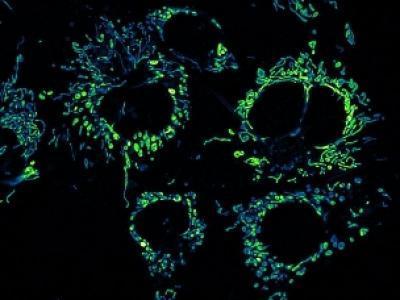Nanoparticles help kill cancer cells
Researchers in Pennsylvania for the first time reported that 1 / 5,000-diameter nanoparticles of human hair as transporters of anticancer drugs in experiments could kill malignant tumors in humans and Breast cancer cells are implanted in the laboratory.
This finding could lead to the development of a new generation of new anti-cancer drugs that are safer and more effective than conventional chemotherapy drugs.

A new type of nanoparticle can improve cancer treatment, researchers said.(Photo: Hari S. Muddana)
The study is published in ACS 'Nano Letters, a monthly journal
In this study, Mark Kester, James Adair and colleagues at Penn State's Hershey Medical Center and Park University show that some nanoparticles promise to become drug delivery vehicles. However, many of these particles will not dissolve in body fluids and adversely affect cells, making them unsuitable for this task.Although there is potential to be an appropriate carrier, ceramide is insoluble in blood, making it difficult to transport to cancer cells.
Scientists report a potential solution with the use of calcium phosphate nanoparticles (CPNPs). These particles can be dissolved and ceramide coated with calcium phosphate can also dissolve in the blood. With ceramide inside, CPNPs kill 99% of human melanoma cells, and 'very effective' for breast cancer cells.
Penn State Research Fund has patented the calcium phosphate nanotechnology molecule called 'NanoJackets' for Keystone Nano.
- Nanoparticles kill cancer cells by ... punching
- Develop nanotechnology to kill cancer cells
- Successful fabrication of nanoparticles carries many types of cancer drugs
- Golden nanoparticles cure cancer
- 'Factory' produces cancer drugs right in the body
- Explosive gold nanoparticles can eradicate cancer cells to the root
- Kill cancer cells by shining light on gold-paired nanocrystals
- Gold can become a weapon to kill cancer cells
- Can we kill cancer cells when they're sleeping?
- Breakthrough kill metastatic cancer cells
- Singapore discovered how to kill new cancer cells
- Test virus 'kill cancer cells'
 Why is Australia the country with the highest cancer rate in the world while Vietnam ranks 100th?
Why is Australia the country with the highest cancer rate in the world while Vietnam ranks 100th? New drug causes cancer to 'starve'
New drug causes cancer to 'starve' Common cancers in men
Common cancers in men America's incredible discovery: The most feared cancer cell is love
America's incredible discovery: The most feared cancer cell is love Experiment shows Covid virus can shrink tumors of 4 types of late-stage cancer
Experiment shows Covid virus can shrink tumors of 4 types of late-stage cancer  Anti-cancer substance discovered in a familiar mushroom
Anti-cancer substance discovered in a familiar mushroom  Food poisoning bacteria may help fight cancer
Food poisoning bacteria may help fight cancer  New discovery about cancer detection ability of bees and dogs
New discovery about cancer detection ability of bees and dogs  Top 7 Viruses That Can Lead to Cancer You Should Know
Top 7 Viruses That Can Lead to Cancer You Should Know  Russia prepares clinical trials of cancer vaccine
Russia prepares clinical trials of cancer vaccine 